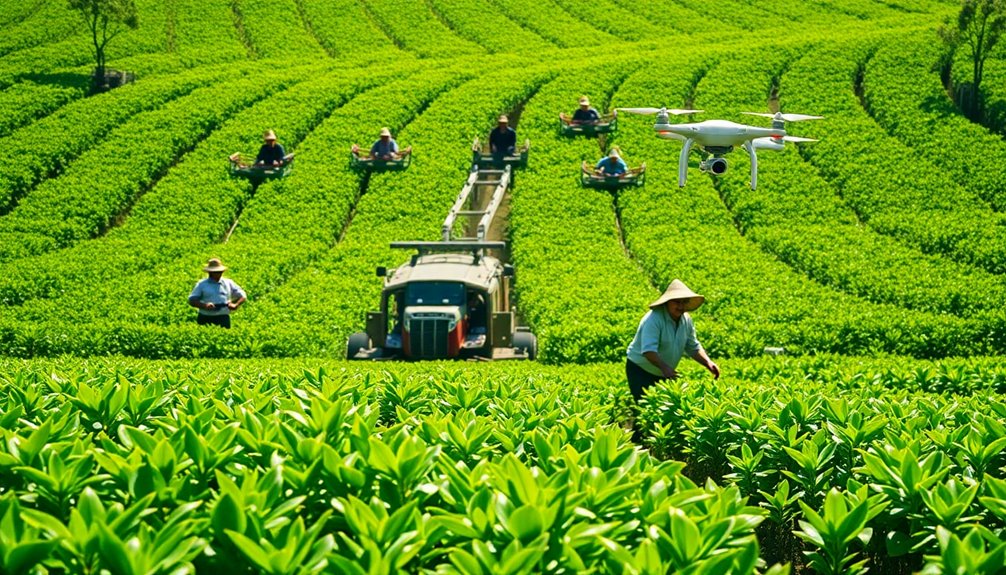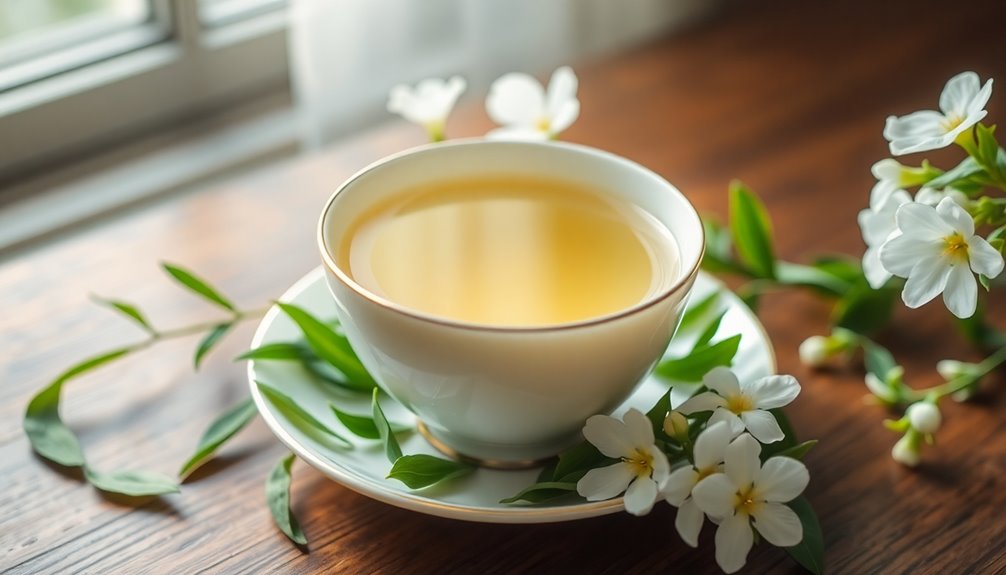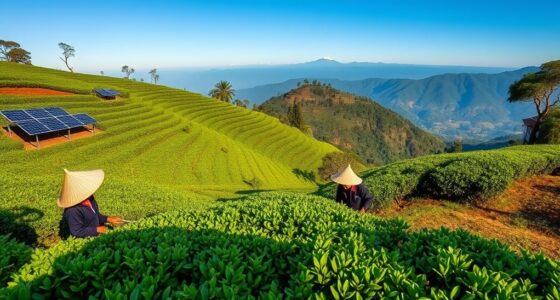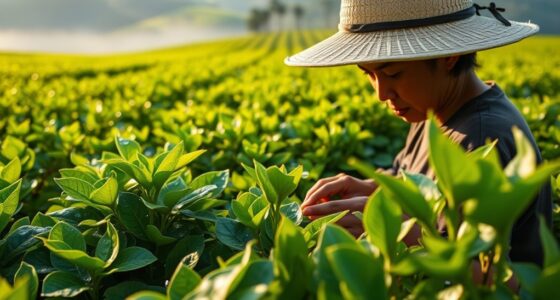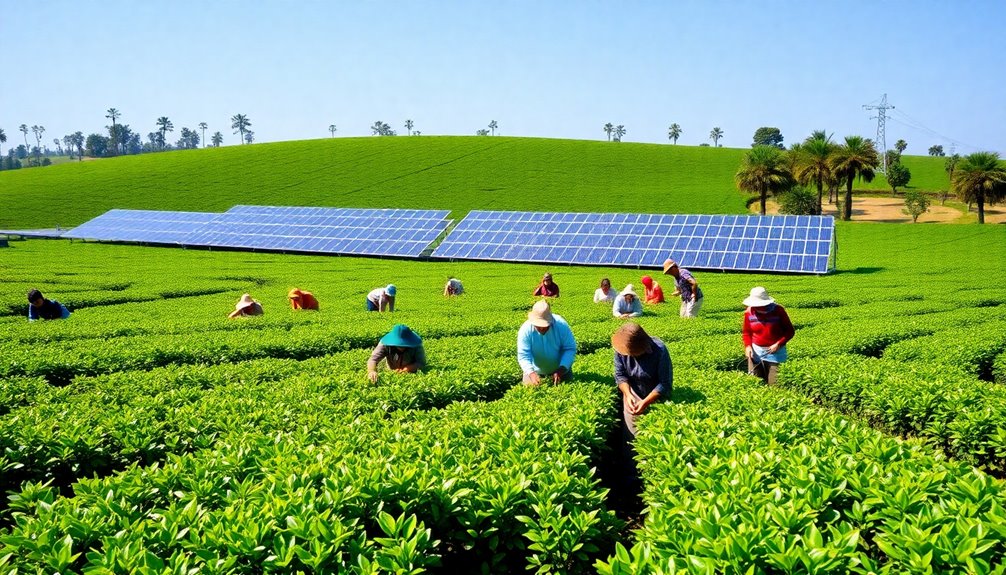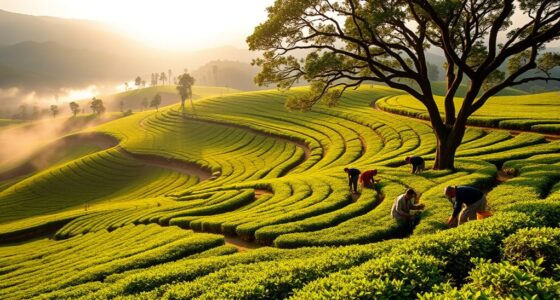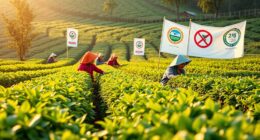Technology plays a fantastic role in ethical tea harvesting! You'll find tools like AI and drones making it easier to pick only the best tea leaves. These machines use special cameras to spot premium leaves, helping you get higher quality tea. Plus, they keep track of plant health so workers can care for tea plants better. Even though some workers might worry about losing jobs to machines, retraining programs help them learn new skills. All this means tea can be harvested in a kinder, fairer way. Stick around to discover even more amazing things about tea and technology!
Key Takeaways
- AI and automation enable precise harvesting, ensuring only mature tea leaves are selected for higher quality production.
- Drones and computer vision provide real-time data on plant health, promoting sustainable farming practices.
- Ethical sourcing practices certified by organizations like Fair Trade ensure fair wages and working conditions for laborers.
- AI-driven training programs enhance workers' skills while improving the quality standards of tea harvesting.
- Addressing worker displacement through retraining initiatives is crucial to maintain social responsibility alongside technological advancements.
Introduction
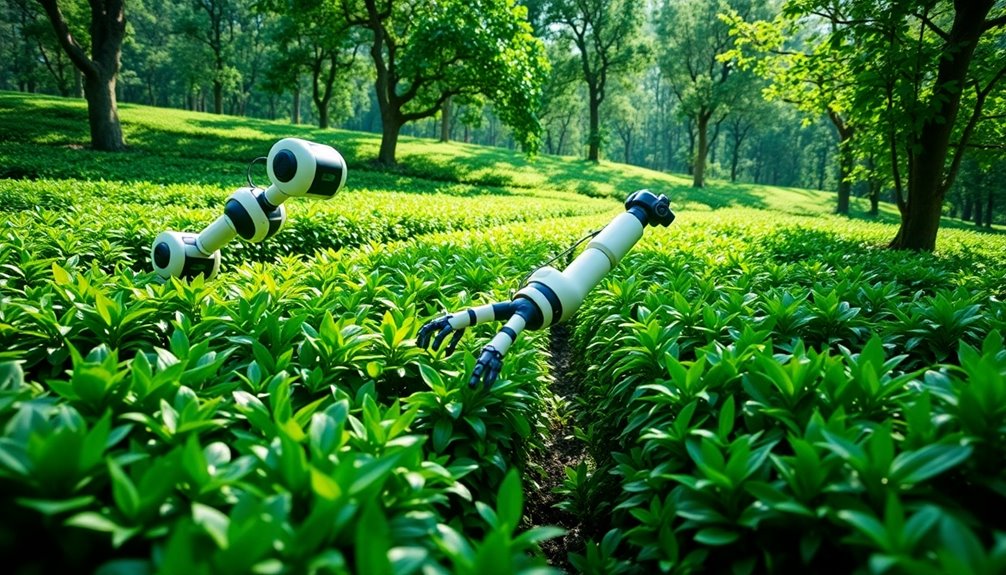
In the world of tea production, technology is transforming ethical harvesting practices. You might be surprised to learn how much tech helps farmers pick the best tea leaves! With the help of artificial intelligence and automation, farmers can now selectively pluck mature leaves. This means less waste and better quality tea for you to enjoy.
Automated systems use computer vision to spot premium tea leaves, ensuring only the best go into your cup. Imagine drones soaring above tea estates, collecting real-time data about plant health and environmental conditions. This information helps farmers make smart choices about when and how to harvest, promoting sustainability.
Plus, mechanized harvesting reduces the need for manual labor. This addresses labor shortages and boosts efficiency, making tea production smoother. As a result, farmers can focus on ethical harvesting practices, which means you're getting tea that's not only delicious but also responsibly sourced.
Ethical Sourcing of Tea Labor
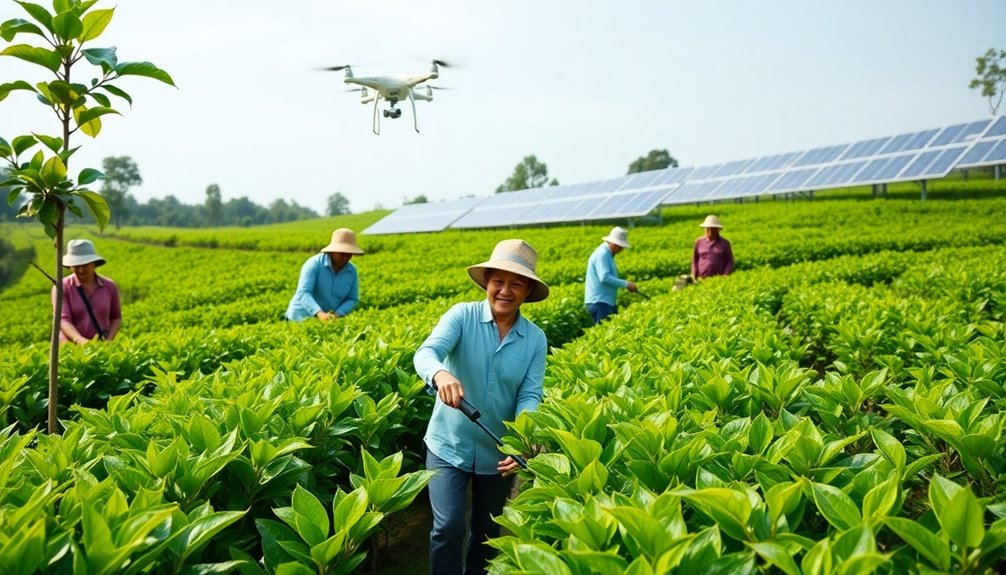
Technology not only enhances the efficiency of tea harvesting but also plays a significant role in the ethical sourcing of tea labor. When you enjoy a cup of tea, it's important to know that the people who picked the leaves are treated fairly.
Ethical sourcing means ensuring that workers have good labor conditions, fair wages, and safe workplaces. Sadly, many tea workers, especially in countries like India and Sri Lanka, face tough situations.
Luckily, technology helps change this! Programs like Fair Trade and Rainforest Alliance set rules that protect workers' rights by banning child labor and promoting gender equality.
Thanks to the Ethical Tea Partnership, more than 1.2 million workers feel the benefits of these programs.
Blockchain technology makes it easier for you to trace where your tea comes from. This transparency ensures that it's sourced from places that follow ethical labor practices.
Plus, with mobile reporting apps, workers can share their concerns, making it easier for producers to stay accountable.
All these tech advancements work together to create a better tea industry, ensuring that every sip you take supports fair labor practices.
AI Enhances Labor Efficiency
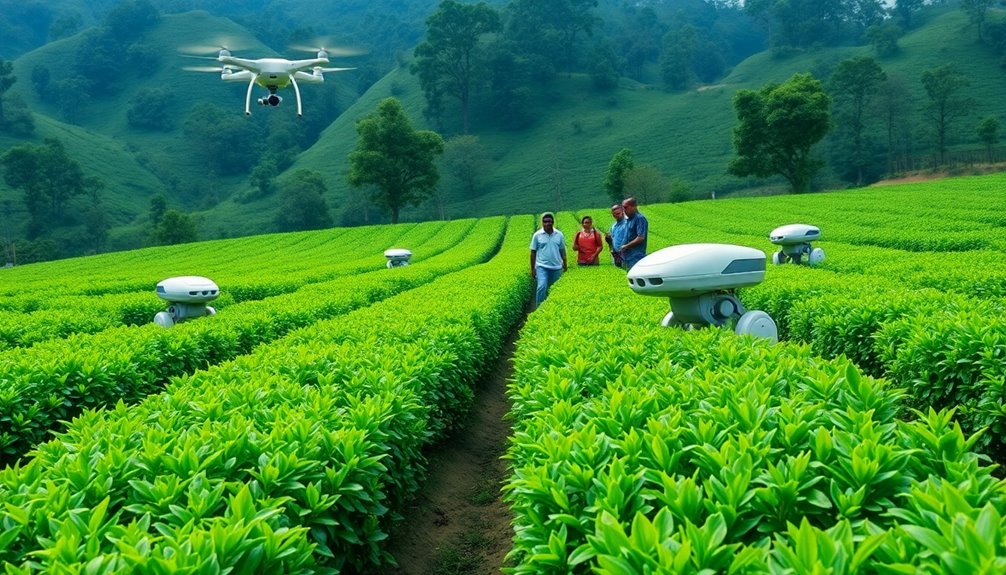
With the rise of AI in tea harvesting, efficiency has reached new heights. Imagine tea farmers using smart machines that can spot the best tea leaves! AI-powered systems can evaluate leaves by looking at their size, color, and texture. This means only the premium leaves get picked, making the tea tastier and more aromatic.
These amazing AI tools help farmers by distinguishing between ripe leaves and unwanted plants. This selective plucking boosts both quality and yield.
Plus, these machines can watch the tea plants in real-time. They adjust to changes in the environment, ensuring that harvesting is fast and effective.
By focusing on quality, AI reduces waste and helps create consistent products. This means less tea goes to waste, which is great for sustainable practices!
While it might seem expensive to start using AI, the long-term savings make it worth it.
Ai-Driven Labor Skill Training
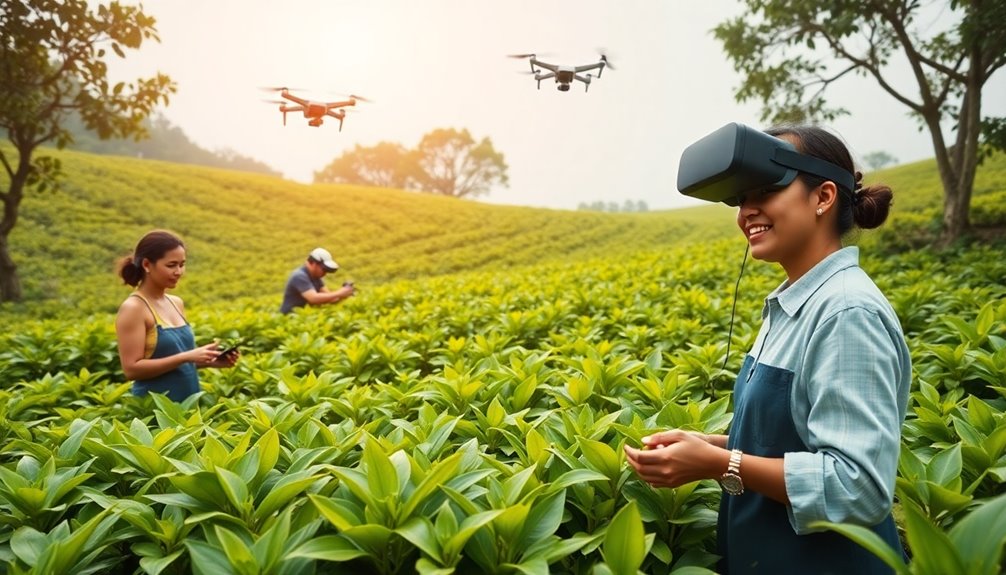
Often, AI-driven labor skill training programs revolutionize how new workers learn the art of tea harvesting. These exciting programs use smart technology to study the techniques of experienced workers. With this knowledge, they create special lessons just for you!
You can practice in a safe space, simulating real-world harvesting scenarios. This helps you gain confidence and improve your skills.
One of the coolest features of AI-driven training is its ability to give you instant feedback. Imagine learning exactly what you need to do to pick the best tea leaves!
You'll understand the quality expectations for premium tea, which is super important. Plus, these platforms analyze data from different tea estates. This means you'll learn the best harvesting practices specific to each tea variety.
Worker Displacement Concerns
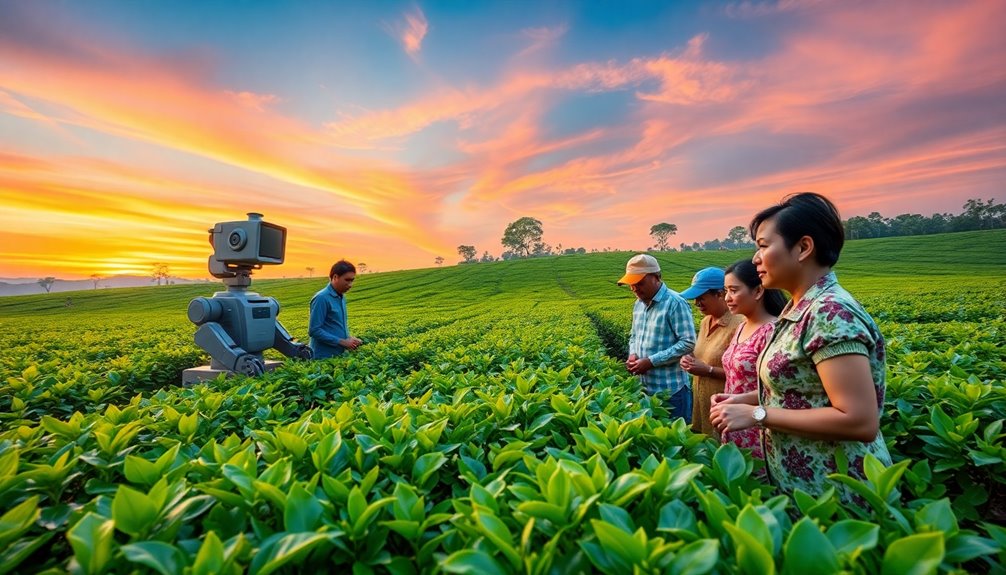
As AI-driven labor skill training enhances the learning experience for tea harvesters, it also raises pressing concerns about worker displacement. You might feel excited about how technology can help harvesters work better and faster, but it's important to think about the people involved. With automation taking over some tasks, up to 70% of tea workers in certain areas could find themselves without jobs. That's a big number!
While machines can improve efficiency and quality, we need to consider the ethical side of this change. It's vital for tea companies to create retraining programs. These programs can help affected workers learn new skills and find new jobs in the industry. Without this support, communities could face economic challenges as people struggle to make ends meet.
Balancing technological advancement with social responsibility is key. The tea industry must ensure that the benefits of automation don't come at the expense of workers' livelihoods.
Practical Applications
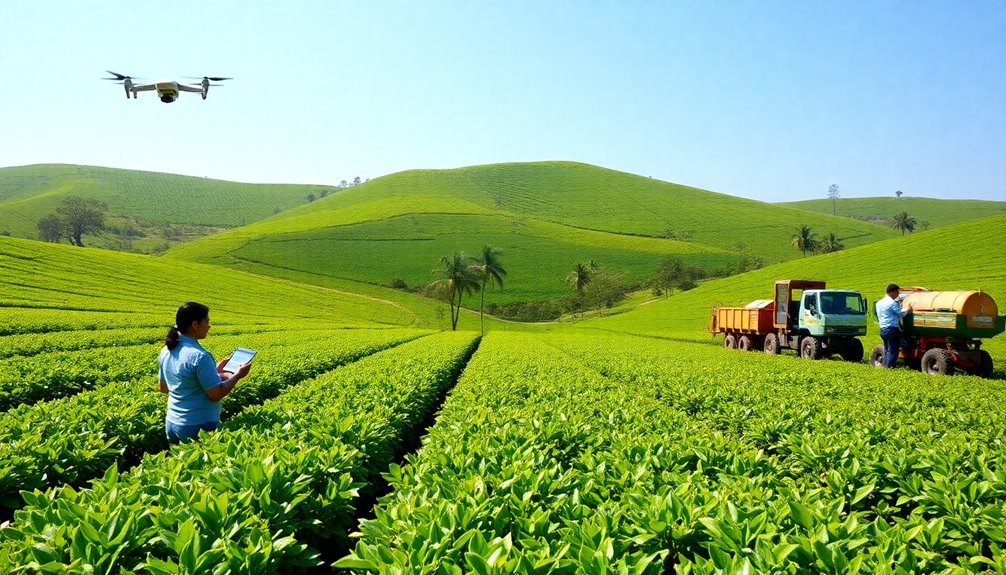
Technology is revolutionizing tea harvesting in several practical ways that enhance both quality and sustainability.
With the help of AI, mechanical harvesters can now selectively pluck only the ripe tea leaves. This means you get higher quality tea and less wasted leaves! Isn't that amazing?
Drones are another exciting addition. They fly over tea plantations, using special cameras to check the health of the plants. This helps farmers make smart choices about when to harvest, ensuring they use resources wisely.
Plus, IoT sensors in the fields provide real-time data about soil and moisture levels. This lets you apply water and nutrients more sustainably, which is great for the environment.
When it comes to processing the tea, automated systems help maintain the perfect temperature and humidity. This ensures that every cup of tea you drink has consistent quality while minimizing the impact on our planet.
Frequently Asked Questions
How Does Technology Help in Tea Manufacturing Process?
Technology revolutionizes tea manufacturing by automating processes, enhancing sorting accuracy, and optimizing fermentation techniques. It streamlines labor-intensive tasks, improves quality assessments, and boosts efficiency, ultimately ensuring you enjoy a superior cup of tea.
Is Tea Harvested by Machines?
Yes, tea's harvested by machines nowadays. These automated harvesters use advanced technology to efficiently pick mature leaves while minimizing waste. You'll see improved quality and consistency, making the process more sustainable and cost-effective overall.
Is Tea Farming Sustainable?
Yes, tea farming can be sustainable. By adopting practices like organic cultivation, precision agriculture, and water conservation techniques, you can help reduce environmental impact, support biodiversity, and promote ethical labor, ensuring a healthier future for tea production.
When Did Tea Cultivation Start in India?
Tea cultivation in India started around 1823 when the British established successful plantations in Assam. You'll find that this marked the beginning of India's significant role in the global tea market, expanding rapidly thereafter.
Conclusion
In conclusion, technology plays a fantastic role in making tea harvesting more ethical and efficient. With the help of AI, workers can learn new skills and improve their work. While it's important to think about how technology might change jobs, the benefits can be exciting! By using these tools wisely, we can support fair labor practices and enjoy our favorite tea even more. Together, let's raise a cup to a brighter and more ethical tea industry!

